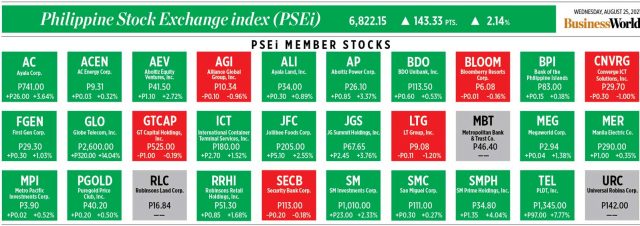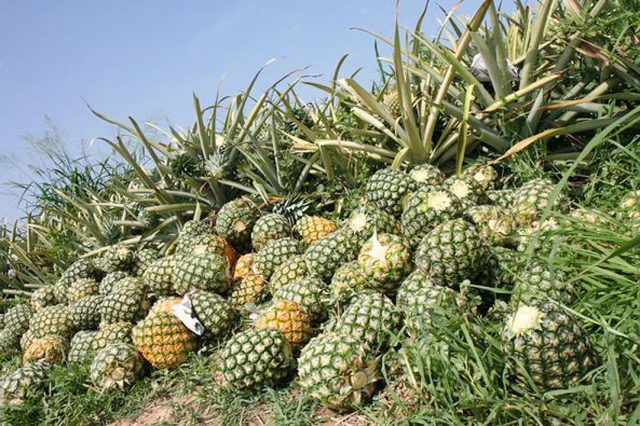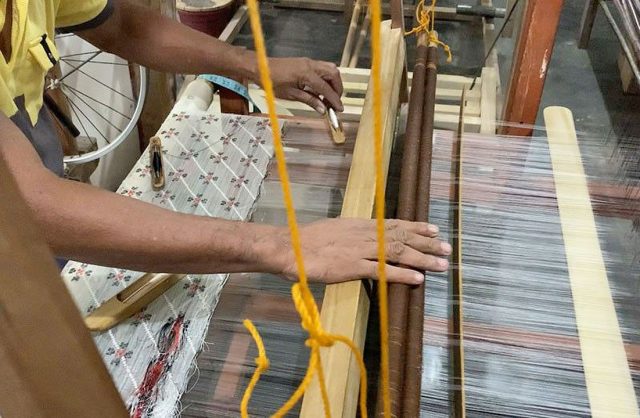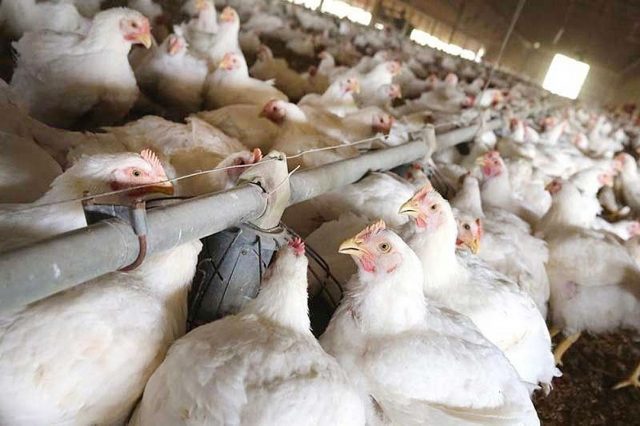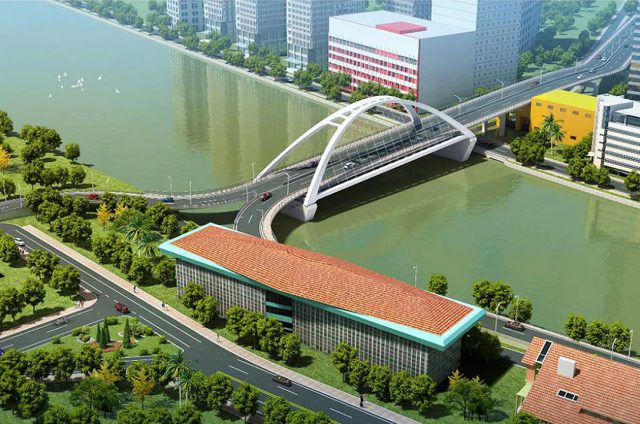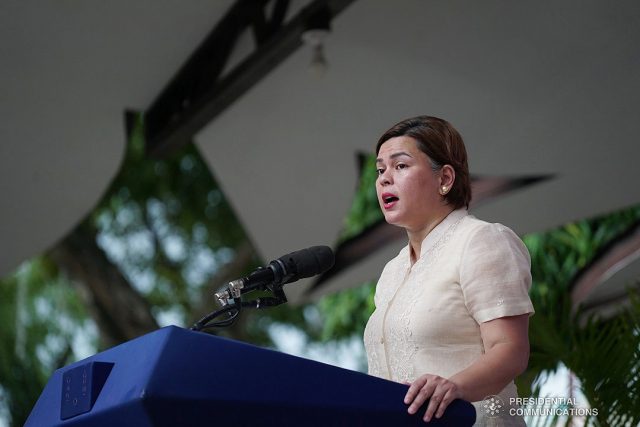RE preferences seen needed to ensure industry takes off
THE DEPARTMENT of Energy (DoE) needs to declare renewables a preferred energy source if it wants to grow the industry, a former official of the National Renewable Energy Board (NREB) said Wednesday.
“How do we push for more renewables? We should declare that renewables to be the preferred energy resource, (and) not (adopt) a technology-neutral policy… We should declare that our policy should be more pro-renewables,” Jose M. Layug, who previously served as NREB chairman, said during a virtual BusinessWorld Insights forum on “Energy’s Sustainable Future in Renewables and Nuclear.”
Energy Secretary Alfonso G. Cusi has said that the department initially pursued a technology-neutral policy, but its “periodic assessment of our country’s energy requirements is paving the way for innovative adaptations in its policy direction.” The department has since declared a moratorium on new coal-fired power plant construction.
According to Mr. Layug, who also leads the Developers of Renewable Energy for AdvanceMent, Inc. (DREAM) industry association, technology neutrality is one of the main obstacles to the development of RE (renewable energy) projects in the Philippines.
 The DoE estimates that RE installed capacity between 2009 to 2020 declined from 34% in 2009 to 29% last year. Meanwhile, coal accounted for 27.4% and 41.7% shares over the start and end of that period.
The DoE estimates that RE installed capacity between 2009 to 2020 declined from 34% in 2009 to 29% last year. Meanwhile, coal accounted for 27.4% and 41.7% shares over the start and end of that period.
He said the department must also make it easier for distribution utilities and electric cooperatives to conduct their competitive bidding process for power procurement; establish a one-stop shop for renewables; simplify rules for the deployment of personnel, vessels, machinery, equipment, spare parts and materials for RE projects; and form a task force dedicated to resolving inter-agency issues.
Eric T. Francia, president and chief executive officer of AC Energy Corp., said that gas is the “most viable” transition fuel as the country embarks on achieving a higher share of RE in its power mix.
“Our point of view is that over the short to medium term, we still need the transition fuel and that would be gas… given that we already have a moratorium on coal, and there’s less support for coal from financial institutions and the broader investment world,” he said during the forum.
He added that battery energy storage systems must be considered a mid-to-longer term solution, while technologies which generate power from green hydrogen must be on the table over the much longer term, or after around 10-20 years.
Meanwhile, Philippine Nuclear Research Institute Director Carlo A. Arcilla said that “nuclear energy should not be seen as competition for renewables, but as a help.”
He said that pursuing nuclear energy can bring down electricity prices, as the fuel source is estimated to be a fraction of the cost of coal.
“If the Bataan Nuclear Power Plant (BNPP) were operating, the (uranium) fuel would last for 18 months. The cost will be $20 million and all the fuel will fit inside a jeepney. If the BNPP on the other hand were a 620 MW (megawatt) coal plant — for the 18 months it would operate, it would require 50 Panamax ships of imported coal (valued at) $600 million. This, alone, (is) why we should at least consider nuclear power,” Mr. Arcilla said. — Angelica Y. Yang
European SMEs could drive Philippine FDI growth — ECCP
THE EUROPEAN business chamber in the Philippines said it is receiving expressions of interest from European small- and medium-sized enterprises (SMEs) considering investing in the country amid a broad rethink of their operations after the pandemic forced many such firms to close shop.
“What we are targeting and where we are also getting inquiries on a constant basis is actually more the small and medium-sized enterprises that are also the backbone of the European economy,” European Chamber of Commerce of the Philippines (ECCP) Executive Director Florien Gottien said in a briefing Wednesday.
The family-run businesses are more risk-averse, which lengthens the process, he said.
But he added that many European companies are considering restructuring, outsourcing, and entering other markets.
European companies in the Philippines were not spared the effects of the pandemic.
Lars Wittig, the new ECCP president, said that some firms — including garment manufacturers — have shut down and left the country.
“To be honest, I’ll be very surprised if any of them came back. Why? Because these companies were of a certain size and working in such an industry, where the time was already two minutes to midnight so to speak because they were in a type of manufacturing maybe that was already obsolete for a market like the Philippines,” he said.
But other sectors have remained in the country. European outsourcing, food and beverage, and manufacturing firms are adapting and “fighting for the best possible outcome.”
“Have we seen any other major, significant investors that have pushed the pause button and left to come back later? No, we have not,” Mr. Wittig said.
Foreign direct investment (FDI) inflows to the Philippines declined to $6.542 billion in 2020 from $8.671 billion in 2019.
But Mr. Wittig is confident about the resilience of European investment in the Philippines.
“European investments last year didn’t drop like the average, which was 24, 25%. It only dropped 12%,” he said. — Jenina P. Ibañez
NPC bans four lending apps over privacy violations
THE NATIONAL Privacy Commission (NPC) has ordered the immediate takedown of four online lending apps that have been the subject of complaints for alleged unauthorized use of personal data.
Borrowers have complained that online lending apps JuanHand, Pesopop, CashJeep, and Lemon Loan have been using users’ personal data to shame and harass them to collect debt.
The companies operating the apps are being investigated for violations of the Data Privacy Act, while their directors, officers, and agents are being investigated for possible criminal liability.
“Apps have gained access to a trove of information in the borrowers’ mobile devices, including contacts and social media data, that are excessive and may be weaponized to harass and shame delinquent borrowers before persons in their mobile devices’ contact list to collect debts,” NPC said in a statement Wednesday.
Personal information is being collected and used without user consent, the NPC added. The commission’s investigation arm, after examining the apps, found that they violated transparency rules in the data privacy law.
The commission in four separate orders directed Wefund Lending Corp., Joywin Lending Investor, Inc., Cash8 Lending Corp., and Populus Lending Corp. — operators of Juan Hand, Lemon Loan, CashJeep, and Pesopop, respectively — to stop processing their borrowers’ personal data.
NPC also sent copies of the orders to the National Telecommunications Commission and Google LLC to take down the apps from the internet and app stores.
Privacy Commissioner Raymund E. Liboro said that the ban will help mitigate serious risks to consumer privacy.
“These online lending apps raised many red flags and the companies operating these apps demonstrate problematic data actions that expose borrowers to serious privacy risks and harms,” he said.
The commission said that two of the app operators did not file position papers in response to the findings, while another two failed to convince the NPC that it should not file the ban.
The NPC is investigating more than 200 online lending apps available for download. In 2019, the agency banned 26 apps after their operators failed to answer allegations on the use of personal data to shame borrowers. — Jenina P. Ibañez
Safety fixes seen leading to increased mango, pineapple exports to US
THE Philippines is on track to increase its pineapple and mango exports to the United States after resolving pest and other food-safety issues, the Department of Agriculture (DA) said.
At a virtual meeting earlier this month, the Bureau of Plant Industry (BPI) and the US Department of Agriculture (USDA) Animal and Plant Health Inspection Service “mutually agreed on and threshed out” outstanding issues which will have the effect of increasing the number of ports that can receive Philippine products.
“Expanding the export market of Philippine pineapples and mangoes in the US and other countries will not only enhance our national economy, but more importantly, provide increased income to thousands of farmers and their families in pineapple- and mango-producing provinces nationwide,” Agriculture Secretary William D. Dar said.
Joselito L. Antioquia, OIC of the BPI National Plant Quarantine Services Division, said one of the issues resolved was the acceptance by the USDA that the Smooth Cayenne variety of pineapple exported by the Philippines does not host the oriental fruit fly.
As a result, Mr. Antioquia said the Philippines may begin exporting pineapples to various US markets before the end of the year, adding that the USDA will brief the BPI on risk mitigation measures to take against the oriental fruit fly.
“After the BPI agrees on the measures, the USDA will publish the initial notice in the Federal Register for a 60-day stakeholder comment period, review any comments, and then publish the final notice that allows the expanded market access for Philippine pineapples into the US, except Hawaii,” Mr. Antioquia said.
According to the BPI, Philippine pineapple exports currently reach the US via Guam, the Marianas Islands, and the North Atlantic regions of the US, with 346,190 kilograms of exports recorded between 2013 and July 15, 2021.
Another settled issue was the agreement that the USDA will draft a plan for the irradiation of fresh mangoes upon arrival in the US.
The DA said the irradiation of mangoes is an option offered by the USDA after the Philippines requested to remove the pre-clearance inspection procedure.
“Irradiation is a phytosanitary treatment that uses ionizing radiation to prevent the introduction or spread of regulated pests by achieving either mortality, preventing successful development like non-emergence of adults, sterility or inactivation,” the DA said.
“The country previously exported fresh mangoes to the US, from 2005 to 2008, totaling 386,099 kilograms, all produced in Guimaras Island,” it added.
The DA said the agricultural export process to the US will be eased by the inclusion of the Philippines in the “ePhyto Hub,” organized by the International Plant Protection Convention.
Mr. Antioquia said the BPI is developing systems to connect to the hub.
“The ‘ePhyto’ certification, which is also being pushed by the US, will replace official documents issued by governments with electronic forms to confirm that shipments of plants and plant products traded internationally are free of pests and diseases, and are therefore safe to import,” the DA said.
“Traditionally, certificates are done on paper, which are transmitted between parties by post, courier, or other physical means. The process takes days to complete, and is prone to errors, loss, theft, and counterfeiting. Thus, it slows down trade and, at worst, results in spoiled goods, additional demurrage charges, and frustrated customers and governments,” it added.
Meanwhile, the BPI and USDA also discussed US interest in initiating shipments of fresh US pomegranates to the Philippines.
Mr. Antioquia said the US request concerns the initial pest risk analysis stage, adding that three to six months is needed to accomplish the risk assessment.
“The BPI has already narrowed the pest list scope for pomegranates to top state producers like California, Arizona, New Mexico, and Texas,” Mr. Antioquia said.
According to the DA, the US imported $924 million worth of Philippine farm products in 2019.
Of the total, tropical oils accounted for $353 million, followed by processed fruits and vegetables at $165 million, fruit and vegetable juices $112 million, tree nuts $92 million, and raw beet and cane sugar $36 million. — Revin Mikhael D. Ochave
Invalidated textile-industry tax credits now valued at P1.58 billion
THE COMMISSION on Audit (CoA) rejected P1.58 billion worth of tax credits that had been granted to six textile companies by the One-Stop Shop Inter-Agency Tax Credit and Duty Drawback Center (OSS) between 2008 and 2014, the Department of Finance (DoF) said.
The DoF said in a statement Wednesday that CoA issued notices of disallowances to Capital-Roll Knit Corp. (CRC), Uni-Glory’s Knitting Corp. (UKC), Primeknit Manufacturing Corp. (PMC), Tai-Cheng Integrated Resource, Inc. (TICIRI), Miskhu Industrial Corp. (MIC) and Universal Pacific Knitting Mills, Inc. (UPKM), whose tax credit certificates (TCCs) were later found to have been issued illegally.
In the second quarter, CoA rejected an additional P389.27 million of tax credits that were previously issued to these six companies by the OSS, on top of the P1.195 billion worth of TCCs disallowed as of the end of March.
State auditors disallowed P97.72 million of CRC tax credits last quarter, on top of the P567.2 million worth of TCCs that were rejected previously, bringing its total to P664.92 million. The
CoA also invalidated a fresh batch of TCCs worth P70.88 million issued to UKC, bringing its total to P241.68 million.
It rejected P60.04 million worth of PMC tax credits, bringing the textile firm’s total to P214.31 million.
It also voided P57.54 million in tax credits received by TICIRI, whose running total is now P141.27 million.
MIC had P56.87 million worth of tax credits disallowed during the quarter, to bring the company’s total to P136.98 million.
The commission rejected P46.2 million worth of TCCs issued to UPKM, for a running tally of P127.81 million.
The OSS, an interagency body consisting of representatives from the DoF, Board of Investments (BoI), and the Bureaus of Internal Revenue and Customs, processes applications for TCCs and duty drawbacks.
Tax credits are given to exporters and manufacturers of products for export that are registered with BoI. Proof of duties and taxes on raw materials and supplies are a prerequisite for a TCC; approved applications will then trigger refunds of these taxes.
With approved applications, exporters can then offset the tax credits against other taxes due. However, the DoF has said that companies that illegally obtained TCCs sold the certificates to other companies at a discount which the latter can then use to reduce their own tax liabilities.
It added that based on the CoA findings, the OSS granted the tax credits to either ghost exporters or operating companies that were not in the export business or were not eligible for the tax perks.
In 2018, the DoF formed a task force to investigate and go after officials and companies involved in the illegal grant of tax credits. That year, the agency flagged P11.18 billion worth of TCCs that the OSS granted to 33 textile companies between 2008 and 2014, backed up by CoA findings. — Beatrice M. Laforga
Ban on Dutch poultry imports lifted
THE DEPARTMENT of Agriculture (DA) has lifted a ban imposed on poultry imports from the Netherlands after it reported its outbreak of highly pathogenic avian influenza (HPAI) to be under control.
Agriculture Secretary William D. Dar issued Memorandum Order No. 49 on Aug. 25 which permits imports of Dutch domestic and wild birds and their products, including poultry meat, day-old chicks, eggs, and semen.
Mr. Dar said the ban was lifted after the Netherlands submitted evidence on the disease control measures implemented by its veterinary service to contain the HPAI outbreaks in that country.
“Based on the report submitted by veterinary authorities of Netherlands to the World Organisation for Animal Health (OIE), the outbreaks of HPAI have been resolved following the conditions set in the OIE Terrestrial Animal Health Code,” Mr. Dar said.
“Only poultry meat sourced from the Netherlands or from countries granted system accreditation by the Philippines shall be authorized to be exported into the country. Other system-accredited countries must also have no current ban issued by this office due to HPAI outbreaks,” he added.
Mr. Dar issued Memorandum Order No. 3 on Jan. 11 that implemented a ban on poultry imports from the Netherlands after reports from its Ministry of Agriculture, Nature, and Food Quality confirmed outbreaks of H5N8 HPAI in Utrecht, Friesland, and Zuid-Holland.
As a result, the DA ordered the suspension of the processing, evaluation, and issuance of sanitary and phytosanitary import clearances for such poultry imports.
In 2020, the Bureau of Animal Industry estimates that the Netherlands shipped 124,274.43 metric tons (MT) or 30.9% of the country’s chicken imports.
Due largely to the ban, Dutch shipments had fallen by the end of June to 4,076.10 MT or 2.2% of Philippine chicken imports. — Revin Mikhael D. Ochave
DoF estimates China-funded project pipeline at nearly $1.9 billion
THE PHILIPPINES currently has $1.892 billion worth of loans with China to finance key infrastructure projects, according to the Department of Finance (DoF).
Finance Undersecretary Mark Dennis Y.C. Joven told reporters that the Export–Import Bank of China (China EximBank) is evaluating projects it is planning to finance, including three bridges in Metro Manila, a flood control project in Mindanao and the proposed Subic-Clark railway project.
Currently, Mr. Joven said the country has $4.6 billion worth of official development assistance (ODA) loans and grants from China to support projects that are at least in the initial procurement stage.
Mr. Joven said the loan agreements the country is sealing with China feature more Philippine control over the procurement process.
“In Japanese loans, the project’s financing comes first before the procurement and implementation starts while for China-funded projects, the amount of the loan contract comes in at a later stage (since procurement takes place first) You cannot compare apples to apples with the Japanese because it takes a longer time to contract the loan for the Chinese. But then what’s the advantage? The advantage is basically you have better control over the procurement process,” he said.
China’s loans are all project-based loans which always take a longer time to process than the quick-disbursing program loans meant for budget support.
“The Chinese projects, once they get approved, they get implemented rather quickly and you can see it in the bridges. So are we happy with them, because (the) terms are beneficial to us. We pay a very good interest rate, the terms are good, and the projects are okay,” Finance Secretary Carlos G. Dominguez III added.
However, he noted that the government experienced “difficulties in getting approvals and understanding each other” when its representatives were dealing with their Chinese counterparts to negotiate the loan agreements.
Mr. Dominguez said the loan agreements with China contain provide safeguards for both parties.
Mr. Joven said the projects financed by China had to be bankable to ensure both sides’ interests are protected.
As of 2020, China was the country’s sixth biggest source of ODA with $620.74 million in loans and grants, or 2.02% of the total foreign aid portfolio.
Japan remained the largest source of foreign aid financing for the Philippines with $11.185 billion in total ODA, or 36.44% of the portfolio. — Beatrice M. Laforga
Onboarding the board of directors: Qualifications and vacancies
All powers of a corporation, including the conduct of affairs and the control of properties, are exercised through its board of directors. Thus, it is only proper that the persons composing the board are elected based on the highest standards. The qualifications of directors are primarily governed by the Revised Corporation Code (RCC), as supplemented by special laws and provisions of the corporate by-laws.
To be elected as a director, one must be of legal age and an owner of at least one share of the corporation. Moreover, one should not possess any of the traits or meet any of the conditions for disqualification enumerated in the RCC. A person is disqualified from being elected as a director if, within five years prior to the election, he was convicted by final judgment by a local or foreign court: (a) of an offense punishable by imprisonment for a period exceeding six years; (b) violation of the RCC; or (c) violation of the Securities Regulation Code. Also, he cannot be elected as a director if he was found by a local or foreign authority to be administratively liable for any offense involving fraudulent acts within the same five-year period prior to his election.
Aside from the above conditions, the corporate by-laws can provide additional qualifications, such as educational background, related industry/business experience, or impose prohibitions, such as disqualifying a director of a competitor corporation from board representation in the corporation.
Additional qualifications, such as nationality, may apply for specific industries, e.g., those engaged in partly nationalized activities. In a recent ruling, the Securities and Exchange Commission (SEC) clarified that while the RCC does not impose restrictions on the nationality of the members of the board, the provisions of the corporation’s constitution and by-laws, applicable special laws, and relevant rules and regulations of the regulatory agencies may do so.
For instance, in the case of corporations engaged in the operation of a public utility, which the Constitution limits to corporations owned 60% by Filipino citizens, board seats of foreign shareholders are to be in proportion to their allowed share in the capital. All executive and management positions must be held by Filipinos. The Anti-Dummy Law provides penal sanctions for violations of this limitation. Applying this, foreign stockholders in a public utility corporation may only occupy a maximum of 40% of the membership of the board.
Once qualified and elected, the directors are to serve a term of one year. They may or may not fully complete their term of office for various reasons. Once vacancy in the board occurs, either due to expiration of the term or other reasons, it should be filled up in a timely manner, subject to applicable procedural rules, to enable the board to continue discharging its duties and functions.
A recent ruling issued by the SEC serves as a useful guide in filling up board vacancies. The essential factor to consider in determining the procedure and period to observe is the cause of the vacancy.
Upon the expiration of the term of the directors, the stockholders must elect a new set of board members. The election is usually held during the annual stockholders’ meeting, either on a date fixed in the by-laws, or on another date, which ideally should not be later than the expiration of the board’s term.
If the stockholders remove a director from office for a justifiable reason, during a special meeting held for that purpose, they may elect a replacement in the same meeting. However, for the electoral process to be valid, the agenda and notice of the meeting must include the replacement election.
As a general rule, the right to elect a director rests on the stockholders. However, as an exception, the law allows the remaining directors to fill the vacancy. For reasons other than the expiration of term and removal, such as the resignation of a director, the remaining directors if still constituting a quorum may elect the replacement “so as not to retard or impair the corporation’s operations” (G.R. No. 151969, Sept. 4, 2009). The replacement director can only serve the unexpired portion of the predecessor’s term. The election by the remaining directors or stockholders, as the case may be, must be held no later than 45 days from the time the vacancy arose.
Business continuity is of paramount concern especially during this pandemic. Thus, compliance with the above requirements is imperative to avoid issues on qualifications and elections, and to allow the board to focus on discharge of its duties.
The views or opinions expressed in this article are solely those of the author and do not necessarily represent those of Isla Lipana & Co. The content is for general information purposes only, and should not be used as a substitute for specific advice.
Aimee Rose Dg. Dela Cruz is a director with the Tax Services Group of Isla Lipana & Co., the Philippine member firm of the PwC network.
(02) 8845-2728
aimee.rose.d.dela.cruz@pwc.com
Peso rallies on lower oil prices, wider BoP surplus
THE PESO rebounded versus the greenback on Wednesday as oil prices declined and as the country posted a wider balance of payments (BoP) surplus in July.
The local unit closed at P49.85 per dollar, strengthening by 26.6 centavos from its P50.116 close on Tuesday, based on data from the Bankers Association of the Philippines.
The peso opened Wednesday’s session at P50.08 versus the dollar. Its weakest showing was at P50.17, while its intraday best was its closing level.
Dollars exchanged climbed to $1.06 billion on Wednesday from $967 million on Tuesday.
The peso climbed on the back of lower oil prices and data showing a wider July BoP surplus, Rizal Commercial Banking Corp. Chief Economist Michael L. Ricafort said.
Oil prices declined on Wednesday after two straight days of increases, Reuters reported. Brent crude futures declined by 9 cents or 0.1% to $70.96 a barrel by 0639 GMT while US West Texas Intermediate crude futures declined by 19 cents or 0.3% to $67.35.
Meanwhile, data from the Philippine central bank released on Wednesday showed the country’s BoP position stood at a surplus of $642 million in July, wider than the $8 million surfeit logged a year earlier, on the back of foreign currency deposits and income from the central bank’s offshore investments.
Meanwhile, a trader said the peso appreciated on expectations of a weaker US retail sales report for July.
For Thursday, Mr. Ricafort expects the local unit to move within P49.75 to P50 while the trader gave a forecast range of P49.80 to P50 per dollar. — LWTN with Reuters
Shares rise on foreign buying, vaccine supply
PHILIPPINE shares continued to climb on Wednesday driven by higher foreign buying and as market sentiment got a boost from the expected arrival of more coronavirus disease 2019 (COVID-19) vaccines in the country.
The Philippine Stock Exchange index (PSEi) went up by 143.33 points or 2.15% to close at 6,822.15 on Wednesday, while the broader all shares index rose 53.63 points or 1.29% to finish at 4,198.51.
“The trading month of August is looking less of a ghost month with foreigners buying up the choppy market’s likely approach to 7,000 on the back of more vaccine supply enabling inoculation goals in Metro Manila to be within striking distance,” First Metro Investment Corp. Head of Research Cristina S. Ulang said in a Viber message.
Net foreign buying climbed to P814.59 million on Wednesday from the P291.11 million seen on Tuesday.
Around five million more doses of COVID-19 vaccines developed by Pfizer, Inc. and BioNTech SE, AstraZeneca Plc, and Sinovac Biotech Ltd., are set to arrive this week after three countries pledged to donate to the Philippines.
This is on top of over three million COVID-19 vaccine jabs expected to arrive by the end of the month, which were purchased by the government from Pfizer and BioNTech and Sinovac.
The Philippines has so far administered over 30.69 million COVID-19 jabs, with 13.2 million or 12.21% of the country’s population fully vaccinated.
Meanwhile, Regina Capital Development Corp. Head of Sales Luis A. Limlingan said the US Food and Drug Administration’s move to give its full approval for the vaccine made by Pfizer and BioNTech continued to boost market sentiment.
“Investors continued to buy Philippine shares, [feeding] off news that Pfizer and BioNTech secured a full US regulatory approval for a COVID-19 vaccine. The development is still fueling the US benchmarks, lifting the Dow by 0.09% and the S&P 500 by 0.15% last night,” Mr. Limlingan said in a separate Viber message.
“Investors are also eager to hear US Federal Reserve Chairman Jerome Powell’s speech during the Jackson Hole symposium on Thursday, where he’ll tackle what’s next for the Fed’s bond-buying program,” he added.
Back home, the majority of sectoral indices posted gains on Wednesday except for mining and oil, which declined by 11.35 points or 0.12% to 9,188.26.
Meanwhile, services gained 57.89 points or 3.50% to 1,708.57; property climbed 73.99 points or 2.40% to 3,147.38; holding firms rose 158.52 points or 2.37% to close at 6,837.41; industrials went up by 58.03 points or 0.59% to 9,865.28; and financials improved by 3.67 points or 0.25% to 1,444.26.
Value turnover increased to P6.48 billion with 1.8 billion issues switching hands on Wednesday, from the P5.53 billion with 2.68 billion shares traded on Tuesday.
Advancers narrowly outnumbered decliners, 95 versus 93, while 51 names closed unchanged. — Keren Concepcion G. Valmonte
Duterte daughter wants out of political circus
By Kyle Aristophere T. Atienza, Reporter
DAVAO City Mayor and presidential daughter Sara Duterte-Carpio on Wednesday asked her father not to drag her into his political intramurals.
“I respectfully advise them to stop talking about me and make me the reason for them running or not running,” Ms. Carpio said in a statement.
Ms. Carpio, who topped recent opinion polls on next year’s presidential elections, issued the statement after President Rodrigo R. Duterte said he would run for vice-president next year. He also said he would abandon his presidential ambition if his daughter runs for President.
She said her father had told her about his decision to run for vice president next year with long-time aide Senator Christopher Lawrence T. Go, who is supposedly running for President. “It was not a pleasant event.”
The Davao City mayor said her father had asked her in a letter to either endorse the Go-Duterte tandem in the 2022 elections, or take in Mr. Go as her vice-president.
Ms. Carpio urged his father and Mr. Go “to own up publicly their decision to run as a tandem. If they can confirm it privately, then I do not see the reason why they cannot be candid about it to the public.”
She also said she was not a “last two minutes” person, alluding to how she could become a substitute presidential candidate, which happened to her father in 2016.
“I organize, and I implement accordingly,” Ms. Carpio said. “In the meantime, I refuse to be a political punching bag for a party in complete disarray,” she added, referring to factions in the ruling PDP-Laban.
Ms. Carpio wants to distance herself from her father “because they do not have the same people behind them,” says Jean S. Encinas-Franco, a political science professor at the University of the Philippines.
She’s also trying to portray herself as an independent person “because women politicians, especially someone running for President, normally mimics the strength usually ascribed to men in power,” she said in a Facebook Messenger chat.
PDP-Laban earlier said Mr. Duterte, who is barred by law from running for reelection, had agreed to “make the sacrifice and heed the clamor of the people” by running for vice-president.
Mr. Duterte and his allies might just be “testing the waters” to know public sentiment, Ms. Franco said. The administration is also trying to create an impression that Mr. Duterte’s brand of leadership is still needed.
“This kind of zarzuela is normal in our politics because we do not have genuine democratic political parties,” said Michael Henry Ll. Yusingco, a senior research fellow at the Ateneo De Manila University Policy Center.
“I really cannot say what is wrong with the administration camp because there are too many voices talking and actors positioning themselves,” he said. “What this tells us is that they still do not have a clear and definite campaign plan for 2022.”
Mr. Yusingco said the ruling party is not too fussed because the opposition has yet to put up a united front. “They have the luxury to be this disorganized at this point because there is still no serious threat to their chances of winning in 2022.”
Institute for Political and Electoral Reform Executive Director Ramon C. Casiple said the administration camp was just doing the “art of obfuscation,” noting that a lot is still in the negotiation stage.
“That’s the President’s tactic since his Davao entry into politics,” he said in a Facebook Messenger chat. “Keep them guessing until it’s too late. Don’t take that as the final outcome yet.”
Mr. Duterte on Tuesday night said he would run for vice-president next year. “I will continue the crusade,” he said at a televised news briefing, referring to his campaign against illegal drugs, criminality and insurgency.
“I may not have the power to give the direction or guidance but I can always express my views in public for whatever it may be worth in the coming days,” he added.
In the Philippines, the President and vice-president are elected separately and may come from opposing political parties. The vice-president usually becomes powerless unless the President gives him a key post in his Cabinet.
The Go-Duterte tandem is “merely a smokescreen or distraction for their real candidate,” said Ronward Munsayac, who belongs to a faction in the party allied with Senator Emmanuel “Manny” D. Pacquiao.
“It’s impossible that the right hand of the President will go against his boss’s daughter,” he said in a Viber message. “This tandem is merely a distraction to shield their real candidate from political attacks and to weaken the PDP-Laban with this decoy candidacy.”
He said Mr. Go and Mr. Duterte could withdraw from the race at any time — from the time of the filing of certificates of candidacy up to noon time of election day.
Senator Aquilino L. Pimentel III on Tuesday said choosing the party’s vice-presidential bet before naming its presidential candidate was “an unusual circuitous convoluted process.”
Ms. Carpio said Mr. Pimentel and Mr. Munsayac should “stop blaming me for the sad state of their political party.” “It is not my fault that no one among you is a leader worthy of the respect of the majority. Do not blame me for the sitcom that your party has been reduced to.” — with Alyssa Nicole O. Tan

